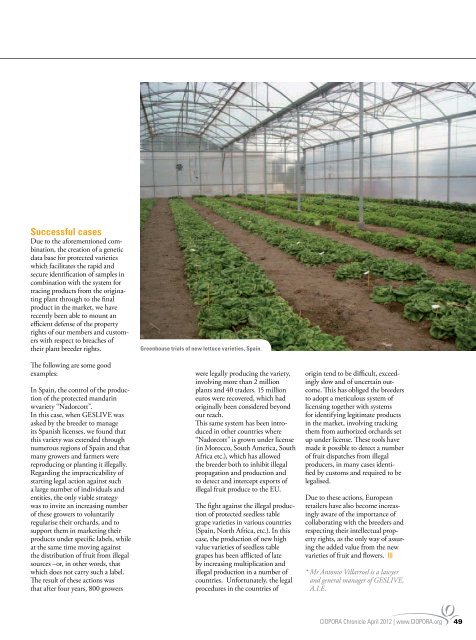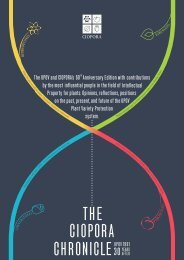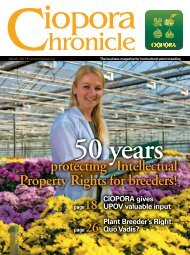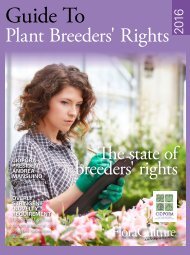2012 CIOPORA Chronicle
CIOPORA annual magazine on Intellectual Property protection for plant innovations 2012. The magazine was produced in cooperation with FloraCulture International. Read in the 2012 CIOPORA Chronicle edition: - Plant Patents in the United States after the America Invents Act - U.S. plant patents compared to UPOV PBR system - Does Belgian patent law need a breeder’s exemption? - How much open access can breeders afford? - IPP and PBR in Chile - IP protection for plant innovations in Canada and much more...
CIOPORA annual magazine on Intellectual Property protection for plant innovations 2012. The magazine was produced in cooperation with FloraCulture International.
Read in the 2012 CIOPORA Chronicle edition:
- Plant Patents in the United States after the America Invents Act
- U.S. plant patents compared to UPOV PBR system
- Does Belgian patent law need a breeder’s exemption?
- How much open access can breeders afford?
- IPP and PBR in Chile
- IP protection for plant innovations in Canada
and much more...
Create successful ePaper yourself
Turn your PDF publications into a flip-book with our unique Google optimized e-Paper software.
Successful cases<br />
Due to the aforementioned combination,<br />
the creation of a genetic<br />
data base for protected varieties<br />
which facilitates the rapid and<br />
secure identification of samples in<br />
combination with the system for<br />
tracing products from the originating<br />
plant through to the final<br />
product in the market, we have<br />
recently been able to mount an<br />
efficient defense of the property<br />
rights of our members and customers<br />
with respect to breaches of<br />
their plant breeder rights.<br />
The following are some good<br />
examples:<br />
In Spain, the control of the production<br />
of the protected mandarin<br />
wvariety “Nadorcott”.<br />
In this case, when GESLIVE was<br />
asked by the breeder to manage<br />
its Spanish licenses, we found that<br />
this variety was extended through<br />
numerous regions of Spain and that<br />
many growers and farmers were<br />
reproducing or planting it illegally.<br />
Regarding the impracticability of<br />
starting legal action against such<br />
a large number of individuals and<br />
entities, the only viable strategy<br />
was to invite an increasing number<br />
of these growers to voluntarily<br />
regularise their orchards, and to<br />
support them in marketing their<br />
products under specific labels, while<br />
at the same time moving against<br />
the distribution of fruit from illegal<br />
sources –or, in other words, that<br />
which does not carry such a label.<br />
The result of these actions was<br />
that after four years, 800 growers<br />
Greenhouse trials of new lettuce varieties, Spain.<br />
were legally producing the variety,<br />
involving more than 2 million<br />
plants and 40 traders. 15 million<br />
euros were recovered, which had<br />
originally been considered beyond<br />
our reach.<br />
This same system has been introduced<br />
in other countries where<br />
“Nadorcott” is grown under license<br />
(in Morocco, South America, South<br />
Africa etc.), which has allowed<br />
the breeder both to inhibit illegal<br />
propagation and production and<br />
to detect and intercept exports of<br />
illegal fruit produce to the EU.<br />
The fight against the illegal production<br />
of protected seedless table<br />
grape varieties in various countries<br />
(Spain, North Africa, etc.). In this<br />
case, the production of new high<br />
value varieties of seedless table<br />
grapes has been afflicted of late<br />
by increasing multiplication and<br />
illegal production in a number of<br />
countries. Unfortunately, the legal<br />
procedures in the countries of<br />
origin tend to be difficult, exceedingly<br />
slow and of uncertain outcome.<br />
This has obliged the breeders<br />
to adopt a meticulous system of<br />
licensing together with systems<br />
for identifying legitimate products<br />
in the market, involving tracking<br />
them from authorized orchards set<br />
up under license. These tools have<br />
made it possible to detect a number<br />
of fruit dispatches from illegal<br />
producers, in many cases identified<br />
by customs and required to be<br />
legalised.<br />
Due to these actions, European<br />
retailers have also become increasingly<br />
aware of the importance of<br />
collaborating with the breeders and<br />
respecting their intellectual property<br />
rights, as the only way of assuring<br />
the added value from the new<br />
varieties of fruit and flowers. |||<br />
* Mr Antonio Villarroel is a lawyer<br />
and general manager of GESLIVE,<br />
A.I.E.<br />
<strong>CIOPORA</strong> <strong>Chronicle</strong> April <strong>2012</strong> | www.<strong>CIOPORA</strong>.org 49









